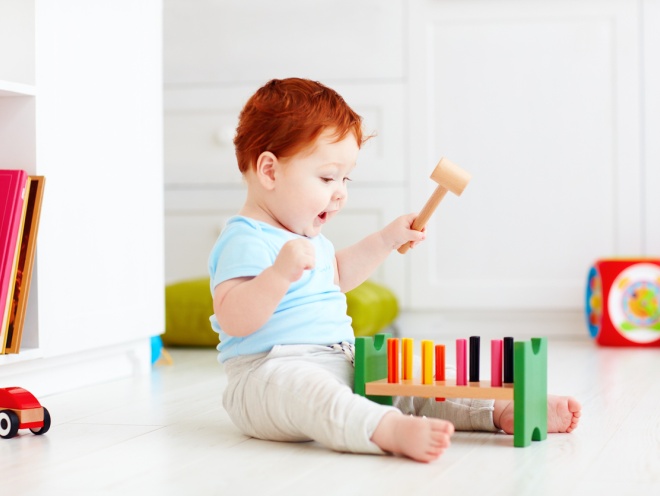What are the best ways to combine fun and learning as your baby starts to find out more about themselves and their environment? Here we discuss some of the games and play that can encourage your child’s development.
Once your baby gets over the six month mark, things start to speed up. From six to 12 months, your baby will become more responsive, more interactive and more dextrous. What happened to that cute little bundle who couldn’t reach anything and lay happily under the jungle gym while you caught up on Netflix?
With so many toys and games to try out, which ones will be best for your child’s development? First things first. It’s not a competition with the other parents (or the books, or the perfect YouTube families). Do what feels right for you and your little ones. As long as it’s safe and you’re having fun.
Welcome to the suck
There’s more reaching, holding, grasping, looking, dropping, problems solving, giggling and mouthing. So much mouthing. Like an Instagram fashionista, your baby will probably be obsessed constantly with new things.
Keeping a child’s attention can be a constant challenge, so here are some games that can be interesting, fun and help with their development. This isn’t an exhaustive list of activities. For even more ideas, just ask friends, relatives, attend a group or search our parenting articles.
Grab'n'go
Your baby at this stage is probably sitting up unaided, reaching out and grabbing (Dosman et al, 2012). And they will grab anything, desperate to explore what’s going on with the world. Which means anything (safe) can become a wonderful new toy.
Your baby might love wooden spoons, balls, building blocks and the ever-popular plastic stacking cups. Your baby is exploring so much with their hands and mouth and enjoying all the new sensations.
Keep on moving
As your baby grows, increased movement can open up a whole new world of toys and games. Provide them with wheeled toys and balls to push across the floor. And offer yourself out as an obstacle course so your baby can crawl all over you. Hilarious for all involved.
You can also take tummy time to a whole new level. Encouraging your baby to crawl towards you, or a favourite toy can be a fun way to motivate them forwards.
Once they start to stand and cruise (holding onto objects and traversing along) try putting a toy just out of their reach so they are encouraged to keep going. Before you know it, they’ll be walking on their own and you’ll be wrapping the entire ground floor in bubble wrap. Safety experts discourage the use of baby walkers because of the high number of accidents associated with their use (Rospa, 2019).
Water babies
Keep up the swimming. Lessons can be a great way to meet new parents and check out poolside fashions. But remember not to compare your little one’s ability to the rest of the class, even if you’re sure they’re already Olympic material.
“I was pretty nervous about dunking Tai in the pool for the first time. It was really nice to have other mums and a trained teacher close by. Once I’d got over myself, I was so proud of us both” Angela, mum to Tai, six months
What? Who? Where?
The classic peek-a-boo proved to be the nation’s favourite game for under twos. And we can see why. The element of surprise. Silly voices. Hiding under sheets. Discovering object permanence. What’s not to love?
Keep reading
You might notice how much your baby likes looking at other babies’ faces. Books starring children (as well as lions, owls and caterpillars) can be a hit. It’s a great way to build their knowledge of eyes, noses, ears and, well, you get the idea.
Construction site
Now is a good time to start putting things in other things. Much to the delight of your baby. Taking things out of boxes, finding objects under paper, hiding them under their towel can all provide fits of giggles for all involved.
It’s also the start of putting things on things. Get yourself (or make) a set of stackable boxes and enjoy the concentration on your child’s face as they use their new skills to build a tower. And then knock it down with even more glee.
Get dramatic
You might have started taking your child to a few classes. And you might have noticed one of the key ingredients is puppets. You don’t have to buy expensive puppets or be RADA trained to be an entertainment hit. As with so many things about parenting, effort, energy and enthusiasm go a long way.
Puppets can also be a good way to introduce concepts of good and bad, right and wrong. Research studies show children as young as three months react differently to puppet characters if they are being helpful or hindering (Hamlin, 2010).
Food, glorious food
Introducing solids at six months brings a whole host of new games. Foods with different tastes, colours, smells and textures combined with improved grabbing can mean endless fun. Parents tell us messy play with food, and baby-led weaning can sometimes help children get to grips (literally) with a larger variety of food. And burn through even more kitchen roll.
Get stuck in
What makes a game is playing it with someone who is having fun. This is your chance to act your shoe size – so get involved. It’ll do you both the power of good.
This page was last reviewed in April 2019.
Further information
Our support line offers practical and emotional support with feeding your baby and general enquiries for parents, members and volunteers: 0300 330 0700.
You might find attending one of our NCT New Baby groups helpful as they give you the opportunity to explore different approaches to important parenting issues with a qualified group leader and other new parents in your area.
Make friends with other parents-to-be and new parents in your local area for support and friendship by seeing what NCT activities are happening nearby.
Child development charity Pathways, has some great ideas for keeping your baby entertained.
Dosman CF, Andrews D and Goulden, KJ (2012). Evidence-based milestone ages as a framework for developmental surveillance. Paediatrics & child health. 17(10):561–568. Available from:https://www.ncbi.nlm.nih.gov/pmc/articles/PMC3549694/ [Accessed 1st April 2019]
Hamlin JK, Wynn W, Bloom P. (2010) 3-month-olds show a negativity bias in their social evaluations. Dev Sci. 2010 Nov; 13(6):923–929. Available from: https://www.ncbi.nlm.nih.gov/pmc/articles/PMC2966030/ [Accessed 1st April 2019]
NHS Somerset Integrated Therapy Service. (2012) Helping a child stepping and standing. Available from: http://www.sompar.nhs.uk/media/1866/advice-sheet-asey012-helping-a-baby-developing-standing-and-stepping-060912.pdf [Accessed 1st April 2019]
Royal Society for the Prevention of Accidents. (2019) Child safety policy. Available from: https://www.rospa.com/home-safety/resources/policy-statements/child-safety/ [Accessed April 2019]





